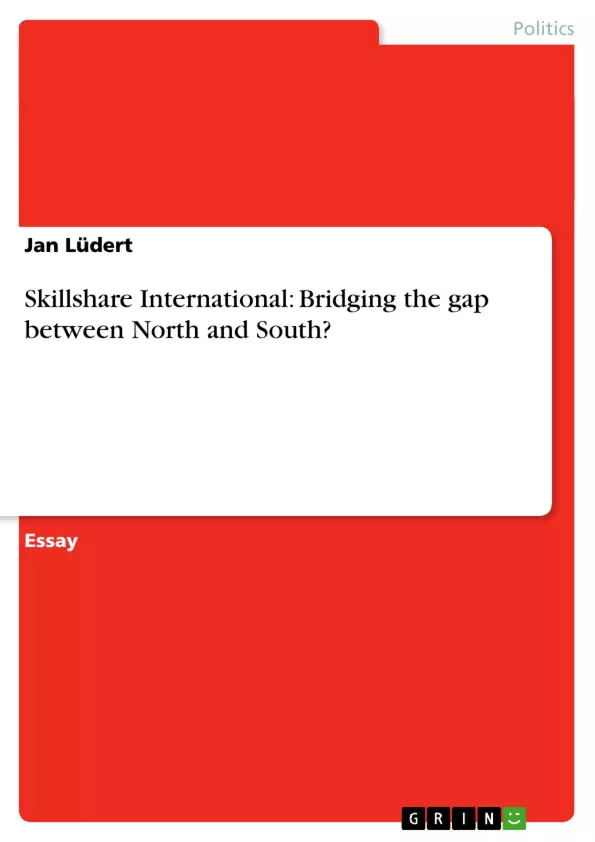The gap between rich and poor has never been so wide. The income of the richest fifty
million people (a mere one percent of world population) is at par with the combined
income of 2.7 billion people sharing a life of extreme poverty.1 Moreover the unequal
distribution of wealth and social wellbeing measured in levels of education or literacy,
life expectancy, child mortality and economic performance are geographically skewed.
The people in the north of the globe are living a good life, while the people living south
of the tropic of cancer often struggle for survival. Especially on the African continent,
‘development’ has failed. The statistics for Sub-Saharan Africa’s development are
particularly alarming. Here real per-capita incomes have dropped significantly over the
last decades leaving half of the population with less than One Dollar ($1) per day.2
HIV/AIDS and other communicable diseases continue to cripple the region like nowhere
else on the planet, not only challenging ongoing development efforts, but also by filling
orphanages and cemeteries in a disturbing pace.3
Inhaltsverzeichnis (Table of Contents)
- Skillshare International: Bridging the gap between North and South?
- Skillshare International: a northern NGO working in the South and back?
- Funding structure
Zielsetzung und Themenschwerpunkte (Objectives and Key Themes)
This paper explores the role of Skillshare International (SKI), a UK-based development agency, in bridging the gap between the rich North and the poor South. The paper examines whether SKI contributes to development and acts as an autonomous actor or a mediatory institution within the global development paradigm.
- The role of NGOs in global development
- The North-South development paradigm
- The influence of NGOs on civil society
- The funding structure of NGOs
- The relationship between NGOs and states
Zusammenfassung der Kapitel (Chapter Summaries)
- This chapter examines the global context of development and highlights the growing presence of NGOs in Africa. It discusses the role of NGOs in addressing the challenges of unequal development and the increasing reliance on them to provide goods and services, promote democracy and good governance.
- This chapter focuses on Skillshare International (SKI) as a case study of a Northern NGO working in the South. It examines the organization's background, its funding structure, and its partnerships with government agencies like DFID. The chapter also explores SKI's stated goals of reducing poverty, injustice and inequality and its commitment to skills sharing and social change.
- This chapter delves deeper into SKI's funding structure, highlighting its heavy reliance on government and other donor agencies. The chapter discusses the various funding sources for SKI, including DFID, the European Union, Comic Relief, and others. It also analyzes the impact of funding fluctuations on the organization's operations.
Schlüsselwörter (Keywords)
The paper focuses on the key concepts of North-South development, NGOs, civil society, development aid, funding structures, partnership programs, and the role of NGOs in promoting social change and reducing poverty.
Frequently Asked Questions
What is the primary goal of Skillshare International (SKI)?
Skillshare International is a UK-based NGO that aims to reduce poverty, injustice, and inequality by sharing skills and promoting social change in the Global South.
How wide is the global gap between the rich and the poor according to the text?
The richest 1% (50 million people) have an income equal to the combined income of 2.7 billion people living in extreme poverty.
What are the main development challenges in Sub-Saharan Africa mentioned?
Key challenges include dropping per-capita incomes, extreme poverty (less than $1 a day), and the devastating impact of HIV/AIDS and other communicable diseases.
How is Skillshare International funded?
SKI relies heavily on government and donor agencies, including the UK’s Department for International Development (DFID), the European Union, and Comic Relief.
Does the paper view SKI as an autonomous actor?
The paper examines whether SKI acts as an autonomous actor or a mediatory institution within the global development paradigm, given its reliance on state funding.
What role do NGOs play in African development according to this study?
NGOs are increasingly relied upon to provide goods and services, promote democracy, and foster good governance where state efforts may have failed.
- Citation du texte
- Jan Lüdert (Auteur), 2006, Skillshare International: Bridging the gap between North and South?, Munich, GRIN Verlag, https://www.grin.com/document/90074



